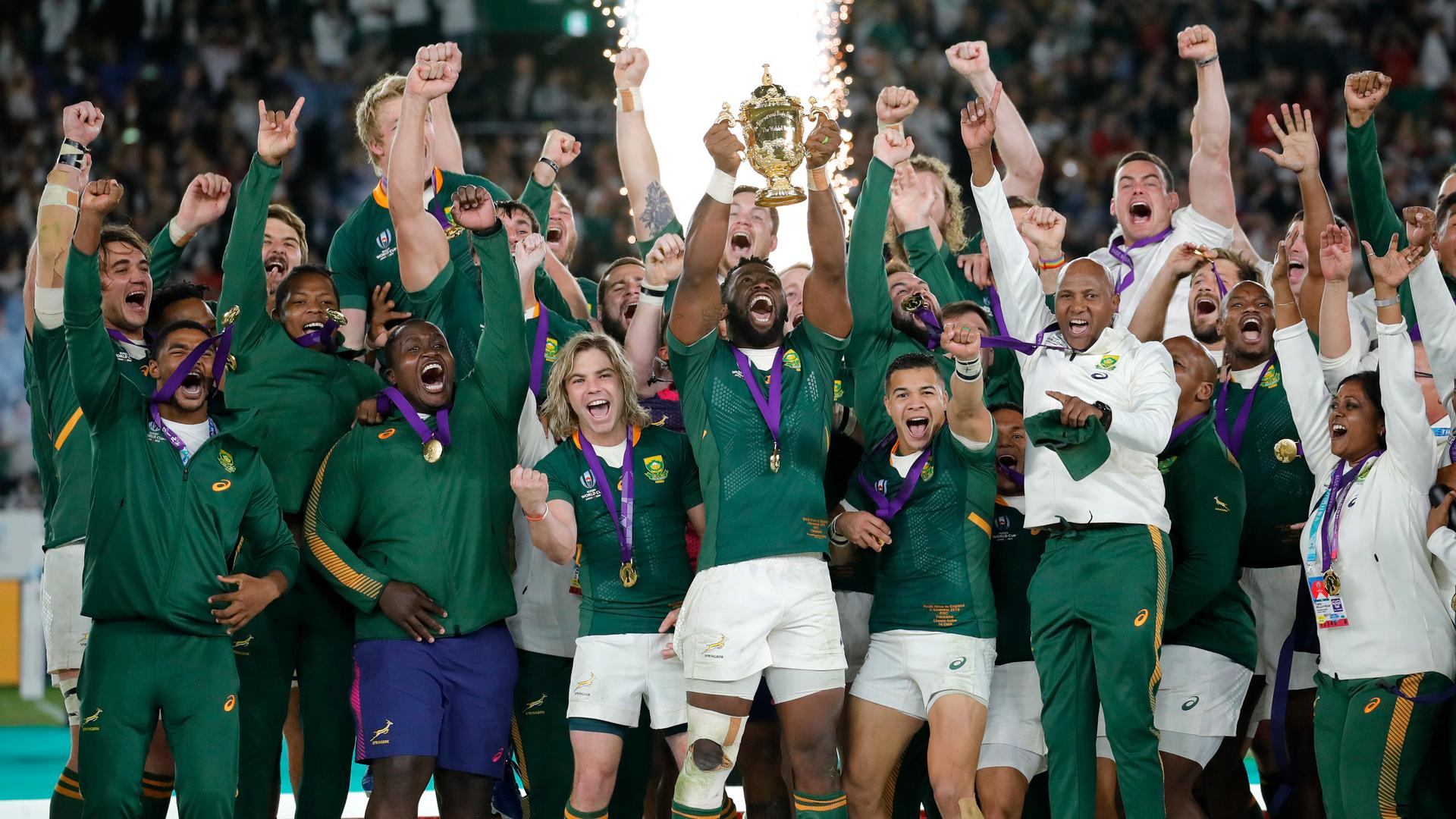For the first time in 127 years, a black man captained the South African national team, the Springboks, to a Rugby World Cup victory. But his story should not fool us into thinking South Africa has overcome its racist past.
We are told that Siya Kolisi’s rags-to-riches journey is a “story to inspire far beyond the rugby pitch“. However, we must pay attention to the narrative lurking beneath the surface of Kolisi’s origin story – the narrative of white benevolence and power, where a rare opportunity is given to an exceptional, deserving, hard-working black man from “abject poverty”.
From reading the articles written about Kolisi, one is led to believe his family was impoverished, immature and incapable of parenting. His mum and dad were both, we are told, teenagers when they had him. His mother goes on to have two more children but tragically dies when Kolisi is 15. His half-siblings are left in “orphanages and foster care” until Kolisi adopts them.
Accounts of his father are elusive – the stereotypically detached black father. Kolisi’s benevolent, but incapable, grandmother steps up in his parent’s absence but struggles to feed him adequately and pay for his school fees.
These selective slices of family history, without any context, only serve to subtly disapprove of poor black people’s ‘choice’ to have children. They cast Kolisi’s family within the tired, old Western media tropes – the poor, uneducated black family who cannot be there for their innocent, poor, helpless children.
Instead of letting poverty be the sole backdrop of Kolisi’s origin story, we should see his hard-fought struggle to the top in the context of a failing political and socio-economic system and entrenched racial inequalities.
Still, 25 years after Apartheid, there has been a failure by both black and white elites to challenge white supremacy, generate equitable economic growth and create an enabling environment where the poorest – who are disproportionately black – can flourish and escape the cyclical pull of poverty.
Unsurprisingly, it is when we come to Kolisi’s next chapter, his ‘becoming’, that ‘white saviours’ enter his life as the givers of opportunity to a, note, exceptional black man.
At age 12 he is offered a full scholarship at a “prestigious” white-majority private school, after being spotted by a white rugby coach. White hands continue to hold power, acting as gatekeepers to opportunities and social status: a school friend’s family paid for him to travel abroad for the first time as a teenager, he marries a white woman and becomes a “responsible” family man. In 2018, he was granted the first-ever black captain status by the white Springbok manager.
While his ascendancy to captaincy is an incredible achievement and merit to Kolisi’s hard work, ‘excellence’ and fortitude, the narrative of his success illustrates entrenched white privilege and power in South African rugby, and broader society.
It has taken 24 years after the fall of Apartheid, and 127 years after the Springboks were formed, for a black captain to emerge. Many commentators vainly celebrated how ‘diverse’ and ‘truly national’ South Africa’s squad was this World Cup, declaring the snail-pace change as a sign of the country’s ‘progress‘.
There were twelve black or ‘coloured’ (as mixed-race people are known in South Africa), picked for this year’s 31-man squad. Though there were five more black players in this year’s final compared to the iconic 1995 World Cup final watched by Nelson Mandela a year after Apartheid, there is still a massive gap in representation – as 88 percent of the country’s population is black or ‘coloured’.
Efforts to increase representation do not go far enough and, perhaps unwittingly, perpetuate white advantage. White South Africans make up only 9 percent of the country’s population but remain grossly overrepresented in current “transformation targets” to increase black player representation in the Springboks to 50 percent.
In many ways, this failure to bring equality to the South African rugby team is reflective of the country’s enduring economic problems. The narrative of progress and success surrounding Kolisi’s story serves to whitewash the country’s troubles, by painting a false picture of hope.
Millions of black families are stuck in a cycle of poverty and inequality in South Africa, with few opportunities for escape. The average black household earns four times less than the average white households – R92,893 ($6,229) compared to R444,446 ($29,804) annually. This average figure, however, distorts the extent of inequality – an estimated 30 million people live on under R12,000 ($804) per year in South Africa.
The private school education—which it is insinuated was so pivotal to Kolisi’s rugby career—costs around R53,000 (3,554) per year, remains a privilege of the wealthy white minority and is beyond the reach of the ‘average’ black family and utterly unattainable for the poorest.
South Africa’s Rugby World Cup triumph provides a critical opportunity to see beyond the rhetoric of ‘national unity’ and ‘progress’ and question those in positions of power to consider their privileges.
White South Africans with economic power and black elites that hold political power should not only come together at moments of sporting triumph but should bring in policies that can address and heal South Africa’s current and historic racial and socioeconomic inequalities. Only then can South Africa move forward as a truly united, equal and prosperous nation.
Author: Catherine Fitzgerald
Catherine Fitzgerald is a research lead at Comic Relief. She is currently completing her Masters in Social Policy Research at London School of Economics (LSE), and has a special research interest in unearthing racial inequalities and racism. All views expressed are her own.
Source










Discussion about this post